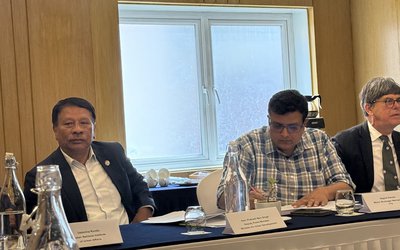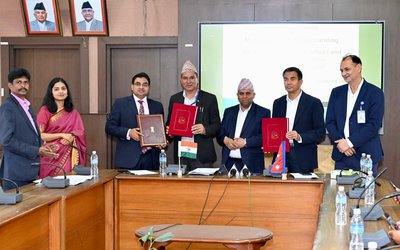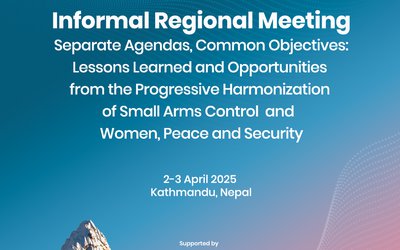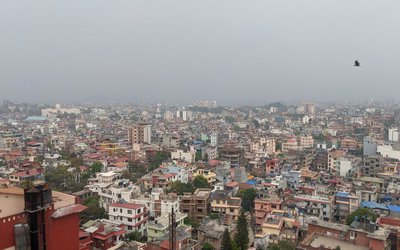
Our collectively untutored judgment followed by hasty decision has no doubt led us to the tumultuous situation we are individually, and as a Nation, facing today. We, the people, believed wholeheartedly in the promises of political leaders that would later be broken; put unquestioned faith on leaders who would ultimately choose to lead only selectively; agreed to change our identity to someone else’s, undermining our own cultural and geographical originality, to be brutally awakened by the shocks of guilt; trusted their commitments to good governance, to the advancement of livelihood for all, and to the creation of a just society, that would all be later unceremoniously sidelined, leaving many genuine souls to be disappointed, dismayed, disgusted, and disillusioned.
But, although ‘mea culpa’ is still missing, a sea-change in perception of position, even from the most radicalized of activists of the past, has recently come to light. Certainly, in a place where forming and deforming alliances without respect for any principle has been common practice for decades, this is not surprising, but in the present context, is certainly noteworthy.
But beauty,as a famous dictum suggests, is in the eyes of the beholder. While the darkness is obvious for many, it is completely overlooked by some, and shallow and ambiguous messages continue to be conveyed by those self-appointed political preachers and welcomed by those who readily endorse such messages in toto, without question.The mass,chaperoned by the preachers,continues to be thrilled with joy from the elixir of propaganda.
A few years ago, that unfathomable joy also led to sealing a marriage of political convenience amongst the institutions which were, by definition, supposed to stay fire walled per the concept of separation of powers. That marriage, which then relied on the doctrine of necessity and political expediency, was not only unholy but also was sure to create several future perceptional misjudgments, mishaps and miscarriages.And now, the sudden death situation ignited by the decision to dissolve the House, call for fresh elections, and nominate and dismiss party cadres and elites will surely make the landscape foggy and confusing. The confusion will also taint all future pronouncements on the constitutional breaches with doubts and disapproval.Understandably, now, there are speculations on all extremes galore.
On a completely different front, the harsh, constantly judgmental, and unpredictable civil society has started protests that appear to thicken more and more. But given the many inherent contradictions in their demands, adequate traction seems to be missing,allowing curious and critical minds to even question whether the system has forgotten to gauge what is just, fair and reasonable.These unchaperoned protest movements may appear strong and spontaneous at first sight but fall short of generating a united and collective strength with a snowball effect. Such movements, despite their cacophonous intensity, however, cannot represent vox populi. The fragmented movement groups first need to unite and prepare for a common front, with a clearly articulated agenda, to become a force not to be reckoned with.
But amid all this, the New Nepal continues to bleed. The wound is severe. The cure proposed yet is debatable and a solution remains remote and unseen. Also, while consultation is continuing and consensus is awaited, the gap between debate pertaining to a system that ‘ought to be’ or a system that ‘can be’keeps widening. At this juncture, whether people and leaders have the courage to take bold steps, including, if needed,those to correct the mistakes of the past,remains the most relevant question. Those who are challenging the constitutional actions of today as serious breaches of the law of the land, curiously and interestingly had failed to question similar breaches of the past, and ironically, the players happen to be the same. In a span of a few months only, the position of anointed experts flip-flopped rapidly. The whirl of the Northerly and the Southerly gales appear to have again affected the decision-making capacity of the gurus of issues of polity.
Indeed, change, whatever its form may be, appears to be inevitable and imminent.Affected by the above, a series of stirs followed by gifting the people with another untested model of governance seems likely. But that would also need to pass the test that people will not feel duped,this time, as happened two decades earlier.Nonetheless, optimism for a better future stays close to our chest, despite the law-and-order of today causing chaos in all direction.
However, the change should not be only for the sake of change. It should be to strengthen the Nation’s stability, to enhance its prosperity, to protect the peoples’ rights, to ensure their equality, and to guarantee adequate and equal development opportunities for all. The change, to be sustainable, should not be only to replace one icon with another and continue to practice the same rituals.
But this time, it will also be critical to follow the due process, respect the principles of natural law,observe the local mores and cultural values, and secure the rights of each without ever over-promising the impossible. Only, with such rigor, the people will be able to pave the much needed path of an adequate and balanced governance for a sovereign Nepal!

Dr. Kishor Uprety
The author can be reached at kshitiz@juno.com
- The Time To Reminisce And Reiterate
- Mar 08, 2025
- Not Yet Totally Lost. Hope Remains!
- Jul 20, 2023
- Book Review: CHAKRABYUHAMA NEPAL KO JALASROT (WATER RESOURCES OF NEPAL IN A LABYRINTH)
- Jan 14, 2023
- An Overture Filled with Confusion
- Nov 27, 2022
- A Tumultuous Destiny
- Apr 18, 2022














